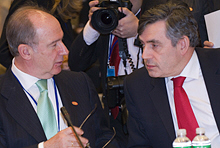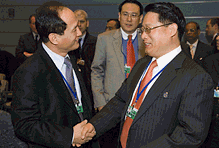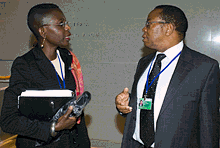
Typical street scene in Santa Ana, El Salvador. (Photo: iStock)
IMF Survey: Plan for Action on Global Imbalances
April 23, 2007
- Imbalances report hailed as "major advance"
- Progress also seen on advancing IMF's reform agenda
- Donors urged to fulfill aid commitments, especially for Africa
Against the backdrop of a bright global economic picture, the world's top economic and financial leaders gathered in Washington April 14-15 for the Spring Meetings of the IMF and the World Bank.

IMFC Chairman Gordon Brown (r) with IMF MD Rodrigo de Rato at the IMFC meeting in Washington April 14 (photo: Thomas Dooley/IMF)
IMF-WORLD BANK SPRING MEETINGS
The leaders embraced policy plans from the biggest economies to reduce the hefty global current account imbalances. They also endorsed a package of IMF reforms, including measures to modernize surveillance, better prevent financial crises, and give developing countries a bigger say in the running of the institution.
The International Monetary and Financial Committee (IMFC), the policymaking committee of the IMF's Board of Governors, welcomed the "continued strong, broad-based expansion of the global economy" and the greater balance in growth among regions. But it warned that "downside risks requiring continued vigilance arise from the possibility of a reassessment of risks in global financial market conditions, of a sharper-than-expected slowdown in the U.S. economy, and of a revival of inflationary pressures as output gaps close or if oil prices rebound." The IMF is forecasting growth of 4.9 percent in 2007 and 2008, down slightly from 5.4 percent in 2006, according to its latest World Economic Outlook.
Global imbalances: country plans
The five parties in the multilateral consultations outlined the following goals aimed at reducing global imbalances—which actually have shown signs of stabilizing and even improving slightly over the past year, in part thanks to past policies:
China: plans to reduce external imbalances; boost domestic demand, particularly consumer demand, and rebalance investment and consumption; further promote balanced external sector development; speed up financial reform; and further improve the exchange regime "in a gradual and controllable manner."
Euro area: plans to further reform the product, labor, and financial markets.
Japan: plans to reform the labor market, facilitate inward foreign direct investment, strengthen competition in key sectors, and further advance fiscal consolidation.
Saudi Arabia: plans to increase spending on social and infrastructure investments and on expanding oil sector capacity.
United States: plans to further fiscal consolidation over the medium term, reform the budget process to contain spending growth, reform entitlement programs to strengthen long-term fiscal sustainability, adopt tax incentives to support private saving, increase energy efficiency, promote pro-growth, open investment policies; and improve capital market competitiveness.
Reducing global imbalances
Over the past year, the IMF has convened several rounds of multilateral talks on global imbalances in an effort to head off risks to global growth that might trigger an abrupt unraveling of the imbalances caused by the large U.S. trade deficit, surpluses in China, Japan, and oil-producing countries, and the need for structural reform in the euro area to boost economic growth.
In a report to the IMFC on April 14, participants in the talks—China, the euro area, Japan, Saudi Arabia, and the United States—provided detailed policy plans elaborating steps already taken and anticipated to support the IMFC's strategy, adopted in 2004, to reduce global imbalances. Europe and Japan said they would seek ways to boost productivity and growth, the United States pledged to rein in budget and trade deficits, Saudi Arabia promised more investment in its oil sector, and China pledged to boost domestic demand and make its currency more flexible (see Box 1).
IMF Managing Director Rodrigo de Rato said that the multilateral consultations were a welcome process, one that would not have been possible "outside a multilateral institution like the IMF." He added that the IMF might propose a similar consultation on the topic of financial market stability. "We believe that if these policies are put into place, there will be significant effects on reducing global imbalances" not only for the five economies but also for the rest of the world. IMFC Chairman Gordon Brown, the U.K. Chancellor of the Exchequer, hailed the report as "a major advance" on a huge issue that has worried policymakers for many years. "The willingness of the participants to make commitments about the future is important in itself." He said that there was "some evidence that the promises that have been made and set down are already being set in motion," giving reason for "some optimism" about the planned reforms.
As for the risk of rising protectionism, the IMFC—which was briefed by World Trade Organization Director-General Pascal Lamy—welcomed the resumption of the Doha Round trade talks and called on members "to work with a renewed commitment to urgently achieve an ambitious outcome." Brown told reporters that "leadership and courage" were now needed to reach a solution and that rich and poor nations alike stand to benefit from a successful round. He noted that Lamy had stressed the importance of an Aid for Trade package so that developing countries would be in a position to benefit from a trade accord by having funds for infrastructure almost immediately. At the Spring Meetings, the Group of Seven major industrial countries said that they would make $4 billion available by 2010 for this purpose.
Progress on IMF reform
Another major focus over the weekend was how the IMF was progressing on its reform agenda—known as the Medium-Term Strategy—which was launched in May last year to enhance the IMF's effectiveness and legitimacy. Both Brown and de Rato stressed that it was very clear that progress was occurring on all fronts.
Surveillance. The IMFC welcomed steps being taken to "strengthen and modernize IMF surveillance to ensure its effectiveness as globalization deepens." It also called upon the IMF Executive Board to continue to give priority to further work on all aspects of this reform, including updating the 1977 Decision on Surveillance over Exchange Rate Policies. It said the goal should be to "improve the quality of surveillance, its focus, candor, and evenhandedness."

Korean Deputy International Affairs Minister Sung-Jin Kim (l), Chinese Vice Finance Minister Li Yong (photo: Thomas Dooley/IMF)
But statements from Fund members underscored the wide range of viewpoints on this issue. U.S. Treasury Secretary Henry Paulson insisted that "for the IMF to remain modern and relevant, it must reinvent itself. . . . First and foremost, the IMF must fundamentally reform its approach to surveillance over exchange rates. Let us be clear. Exercising firm surveillance over members' exchange rate policies is the core function of the institution." Deputy Governor of the People's Bank of China Hu Xiaolian said that "in strengthening surveillance, the Fund should be realistic and not overestimate the role of exchange rates. Biased advice would damage the Fund's role in safeguarding global economic and financial stability." And the Group of 24 (G-24) developing countries said that it remained doubtful that a revision of the 1977 decision was necessary. It noted in its communiqué following an April 13 meeting that "if the IMF has not been more effective in its surveillance (as suggested by persistent global imbalances), it is mainly because systemically important economies have not felt the need to follow the Fund's policy advice."
"Fulfilling aid commitments such as those made at Gleneagles in 2005 is a very important prerequisite to create sufficient space for high social and infrastructure investment. - Rodrigo de Rato"
Quotas and voice. The IMFC reiterated the importance of implementing the program of quota and voice reforms adopted by the Board of Governors at the 2006 Annual Meetings in Singapore. It welcomed the broad consensus reached in the Executive Board on the legal framework of an amendment of the Articles of Agreement about basic votes. It also welcomed the initial discussions on a new quota formula and stressed the importance of agreeing to a new formula that would better capture "the weight and role of members in the global economy while enhancing the voice and participation of low-income members." The G-24 stressed in its communiqué that "the adoption of a package of reforms aimed at increasing the voice and representation of developing countries remains of utmost importance for the legitimacy and effectiveness of the Bretton Woods institutions."
IMF income. The IMFC welcomed the report by a committee chaired by Andrew Crockett to better align the Fund's income with its diverse activities. It underscored that ensuring a sustainable overall budgetary position required action on both the income and expenditure sides, including real spending reductions. The IMFC said it was looking forward to the Managing Director's proposals on a new income model.
The main finding of the report was that the current reliance on income from lending was no longer appropriate. Major recommendations for a new income model included broadening the Fund's investment mandate, investing a portion of quota subscriptions, and establishing an endowment from a limited gold sale. In response to questions from reporters on the likelihood of gold sales, given past opposition from major shareholders, Brown said, "What I found encouraging today was that there were countries who previously had not been prepared to consider gold sales and who were prepared to do so now," He added that "there is no doubt that the gold sales are potentially a part" of the package the Managing Director will put forward.

Liberian Finance Minister Antoinette Sayeh (l), Lesotho Finance and Development Planning Minister Timothy Tahane (photo: Michael Spilotro/IMF)
Emerging market countries. The IMFC welcomed recent progress in clarifying some key aspects of the design of a new liquidity instrument for market access countries. It called on the IMF to "accelerate its work on addressing the design challenges in developing an instrument that would enhance IMF support to these countries' own strong policies and ensure that substantial and timely financing will be available, if needed, while safeguarding IMF resources and paying due regard to the interaction with existing IMF facilities." The G24 similarly urged the IMF to develop a new liquidity instrument "that would provide meaningful, reliable and affordable financial support to face capital account volatility for current and prospective emerging market countries." But it said that although some progress has been made, a recent proposal heard at the Executive Board fell short of these objectives.
Africans welcome China's greater involvement
African ministers attending the IMF-World Bank meetings welcomed greater involvement by China in Africa's development, including its stepped-up trade and increased lending to the resource-rich continent. Sub-Saharan Africa exports to China rocketed to $19 billion, or 15 percent of the region's total exports in 2005, from some $5 billion in 2000 and negligible levels in 1990.
Antoinette Sayeh, Liberia's Minister of Finance, said that, in addition to receiving financial help, Africa could learn from China's rapid development and its enormous progress in poverty reduction.
N'Gandu Peter Magande, Zambia's Minister of Finance and National Planning, noted that his country's ties with China dated back to the 1960s when a key rail link was built. "For us, really, this is an old friend, and we think they're an all-weather old friend." Rama Krishna Sithanen, Mauritius' Deputy Prime Minister and Minister of Finance and Economic Development, said China's involvement was a good example of increasing cooperation between developing countries to complement the historical pattern of North-South trade.
Low-income countries. The IMFC stressed that the Fund should remain fully engaged in helping its low-income members countries achieve sustainable growth and address the macroeconomic challenges critical to the achievement of the UN Millennium Development Goals (MDGs. It called for "continued efforts to help countries reap the benefits of higher aid and debt relief, and avoid a new buildup of unsustainable debt." At a press conference of African finance ministers on April 13, China drew praise for its growing role in providing financial and technical support (see Box 2). The IMFC also thanked the External Review Committee on IMF-World Bank Collaboration, which was chaired by Pedro Malan, noting that it looked forward to proposals from the two institutions to strengthen collaboration.
Still-elusive poverty goals
At the IMF-World Bank Development Committee meeting on April 15, a major theme was scaling up aid, especially for Africa—which is not on track to reach the poverty MDG and looks likely to miss most of the other MDGs, according to the latest IMF-World Bank Global Monitoring Report. World Bank President Paul Wolfowitz told delegates that "there are always risks that the global environment may be less benign in the future than it has been in recent years," and thus "it is more important than ever that all donors and partner countries deliver on the undertakings given in 2005." Later, he told reporters that "the donors unfortunately now are in danger of not fulfilling their promises . . . to increase aid and double aid to Africa"—a concern echoed by de Rato. The committee, which was chaired by Mexico's Secretary of Finance and Public Credit, Agustín Carstens, noted that official development assistance (ODA) flows have grown in real terms over the past decade, but total ODA may have actually declined in real terms in 2006.
Throughout the weekend, questions swirled around whether Wolfowitz would retain his current position in light of the controversy over his role in securing a promotion and pay rise for a close female companion. In its communiqué, the Development Committee expressed "great concern" and asked the Bank's Executive Board to look into the matter and complete its work, adhering to "a high standard of internal governance."


